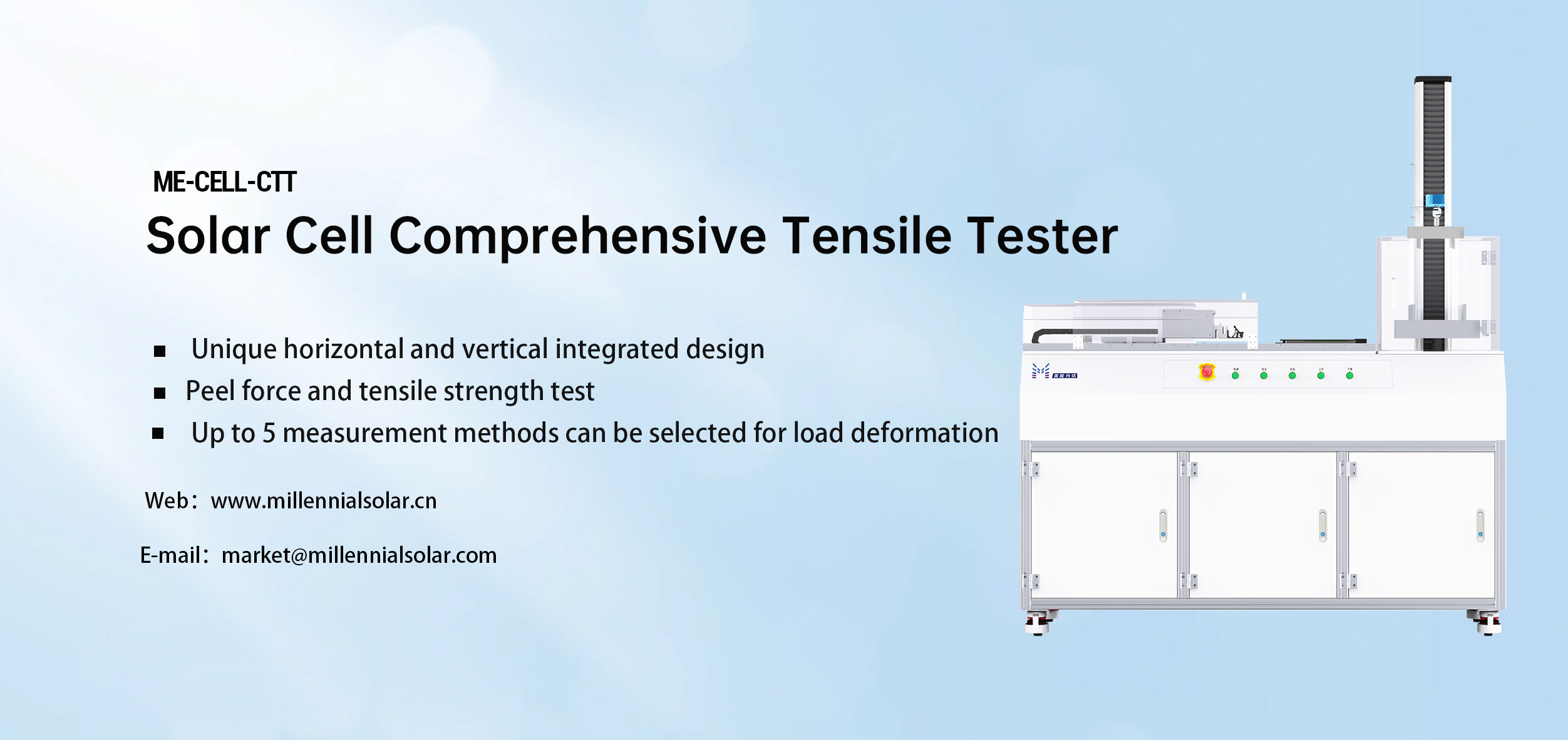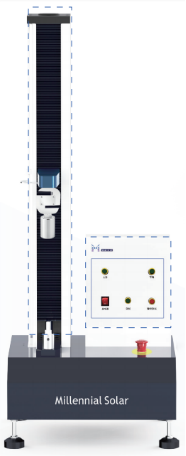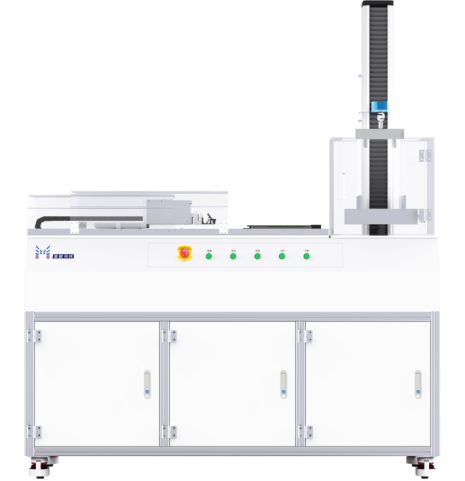
Quantum Efficiency Tester
PL/EL Integrated System
PV-Reflectumeter
3D Confocal Microscope
In-Line Four Point Probe Tester
Four Point Probe Tester
In-Line Thin Film Thickness Tester
Raman Spectrometer
FTIR Spectrometer
Spectrophotometer
Automatic Spectroscopic Ellipsometer
Contact Resistance Tester
Ultra depth of field 3D microscope
Auto Visual Tester
VMM PV Vision Measuring Machine
Solar Cell Horizontal Tensile Tester
Steady State Solar Simulator for Solar Cell
Solar Cell UV Aging Test Chamber
Solar Cell Comprehensive Tensile Tester
Visual Inspection Tester
Wet Leakage Current Tester
PV Module EL Tester
PV Module UV Preconditioning Chamber
Steady State Solar Simulator for PV Module
Current Continuous Monitor
Potential Induced Degradation Test
Bypass Diode Tester
LeTID Test System
Reverse Current Overload Tester
Impulse Voltage Tester
Hipot Insulation Tester
Ground Continuity Tester
Hipot Insulation Ground Tester
Damp Heat Test Chamber
Humidity Freeze Test
Thermal Cycle Test Chamber
Dynamic Mechanical Load Tester
Static Mechanical Load Tester
Hail Impact Tester
Robustness of Termination Tester
Module Breakage Tester
Cut Susceptibility Tester
Peel Shear Strength Tester
Universal Testing Machine (Single-arm)
Universal Testing Machine (Double-arm)
Glass Transmittance Tester
Acetic Acid Test Chamber
EVA Degree of Crosslinking Test System
Junction Box Comprehensive Tester
Drop ball tester
Semi-automatic scanning four-probe tester
Stylus Profilometer
Maximum Power Point Tracker
Perovskite Glass Transmittance Tester
Perovskite P1 Laser Scribing Multifunctional Testing Machine
Perovskite Online PL Tester
Perovskite Online Sheet Resistance Tester
Online Perovskite Film Thickness Tester
Perovskite Process Inspection Workstation
Portable IV Curve Tester
Portable EL Tester
Portable Thermal Imaging Tester
Solar Module Multi-Channel Testing System
PV Inverter Power Quality Tester
Drone EL Tester
IV Tester
IVEL Cell Sorting Machine
Cell Peeling Force and Tensile Strength Test Methods and Environmental Impact Analysis
Date : 3 June 2024Views : 995
The importance of photovoltaic products in the energy field is becoming increasingly prominent, and there are differences in the test methods for different types of cells. Solar Cell Comprehensive Tensile Tester provides a one-stop solution for the photovoltaic industry with its unique horizontal and vertical integrated design, which combines horizontal 180° peeling strength test and vertical cell bending test functions. This article will explore the photovoltaic product test methods and their changes in different environments, and provide practical suggestions for the photovoltaic industry.

Differences in measurement methods for different types of cells (thin-film solar cells, solid-state solar cells)
For different types of photovoltaic products, such as crystalline silicon solar cells and thin-film solar cells, there are certain differences in the test methods for peeling force and tensile strength.
For crystalline silicon photovoltaic cells, the peeling strength test focuses on measuring the adhesion strength between the electrode and the backplane. For example, the electrode peeling strength test mentioned in the T-CSTM00461-2022 standard is to weld the principle welding ribbon to the photovoltaic cell electrode, place it on the peeling force tester, and measure the maximum force required for peeling, in Newtons/meters (N/m). This test method focuses on the adhesion performance of the electrode and the backplane to ensure that the performance of the cell will not be affected by peeling during long-term use.

Universal Testing Machine
For thin-film solar cells, especially flexible thin-film photovoltaic modules, the tensile test is mainly used to determine the yield strength, tensile strength and elongation of the material. In addition, the thin film tensile strength tester clamps the thin film sample and applies gradually increasing tensile force to it, records the force-displacement relationship during the stretching process, and thus obtains the key parameters of the film such as tensile strength and elongation at break. This equipment is usually equipped with high-precision sensors and control systems. Solar Cell Comprehensive Tensile Tester is a horizontal and vertical integrated cell tester that can simultaneously perform horizontal 180° peel strength test and vertical cell bending test. The vertical test module consists of two parts: electrical and mechanical. The mechanical part uses the motor of the electrical part as the original power, uses the forward and reverse rotation of the motor, and reduces the speed to the speed required for the test through the worm gear and reducer, and then drives the central link plate to move up and down through the screw drive to cooperate with the fixture to realize the tension and compression process of the fixture. After the sample is stretched, compressed, torn or other forms of damage, the tension, pressure value, tear force value or other forms of force value can be directly read from the display.
Factors affecting the peel force and peel strength of photovoltaic cells
The variation law of the peeling force and tensile strength of photovoltaic cells under different environmental conditions is mainly affected by many factors.
First, the state of the silicon wafer surface, especially its velvet state, has a significant effect on the electrode peeling strength. The velvet state of the silicon wafer directly affects the contact between the slurry electrode and the silicon wafer surface and the degree of diffusion between the two, and the front end affects the bonding force between the electrode and the silicon wafer.
Secondly, the printing process is the key to controlling the thickness of the electrode film. The thickness and type of the screen selected in the printing option directly affect the thickness of the silver film, and the appropriate silver film thickness is to ensure good contact with the solder tape diaphragm. The occurrence of electrode over-welding.
Third, the evaporation process also plays a decisive role in the density of the electrode film. Through a suitable evaporation process, the density of the electrode film can be improved, thereby enhancing the bonding force between the electrode and the silicon wafer. In addition, the density formula of the electrode slurry is also an important factor affecting the electrode segmentation strength, including the selection and proportion of components such as silver powder, glass and solid content. At the same time, the rationality of the electrode layout design also affects the welding effect. Different designs will bring different welding effects. Finally, factors such as welding method, process type, and welding strip type and width affect the electrode cutting strength.
Solar Cell Comprehensive Tensile Tester is a device designed specifically for the photovoltaic industry to ensure the stability and reliability of the test process. The equipment uses a high-precision s-shaped sensor, stainless steel material, and a load voltage range of 0N to 100N, which meets the testing requirements of cells of different specifications. The optimized design and process ensure excellent performance.
Solar Cell Comprehensive Tensile Tester

E-mail: market@millennialsolar.com
Solar Cell Comprehensive Tensile Tester is specially used for testing the peeling force, tensile strength and other related products of silicon wafers, silicon materials, modules and other related products in the photovoltaic industry.
The unique horizontal and vertical integrated design combines horizontal 180° peeling strength test and vertical cell bending test;
The horizontal test module can use up to 28 sensors at the same time;
The vertical test module can be used for stretching, compression, bending and other tests of finished batteries or materials;
It complies with GB/T16491-2009, GB/T16491-96 and JB/T17797-95 national standards.
The emergence of Solar Cell Comprehensive Tensile Tester not only fills the gap in quality inspection equipment in the photovoltaic industry, but also injects new vitality and power into the development of the industry. Its high-precision testing performance, multi-functional design and certification in accordance with national standards make it a reliable guarantee for the quality control of photovoltaic products. In the future, with the continuous development of the photovoltaic industry, Solar Cell Comprehensive Tensile Tester will continue to play an important role and contribute to the progress and innovation of the industry. Let us work together to promote the photovoltaic industry towards a better future!

































































